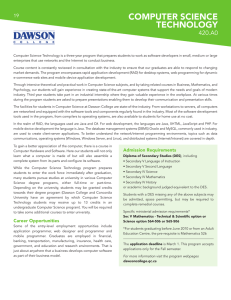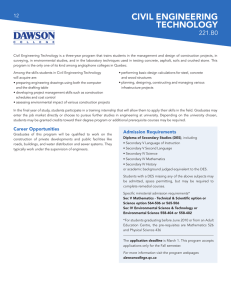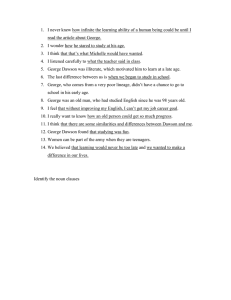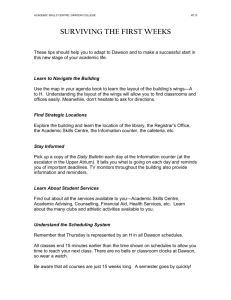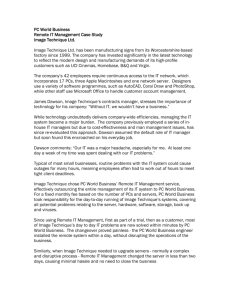Dawson College Computer Science Technology
advertisement
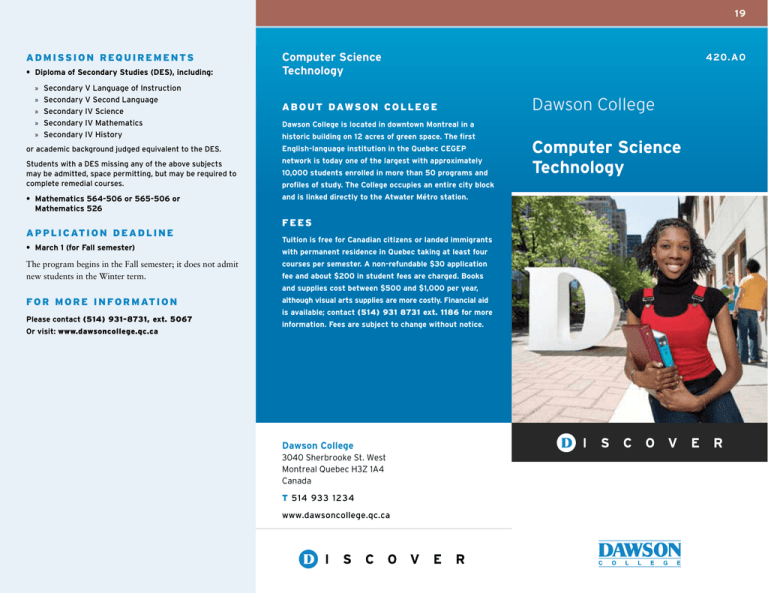
19 A D M I SS I ON R E Q U I R E M ENTS • Diploma of Secondary Studies (DES), including: »» »» »» »» »» Secondary V Language of Instruction Secondary V Second Language Secondary IV Science Secondary IV Mathematics Secondary IV History Computer Science Technology A b o u t D aw s o n C o l l e g e historic building on 12 acres of green space. The first English-language institution in the Quebec CEGEP Students with a DES missing any of the above subjects may be admitted, space permitting, but may be required to complete remedial courses. network is today one of the largest with approximately • Mathematics 564-506 or 565-506 or Mathematics 526 and is linked directly to the Atwater Métro station. • March 1 (for Fall semester) The program begins in the Fall semester; it does not admit new students in the Winter term. 10,000 students enrolled in more than 50 programs and profiles of study. The College occupies an entire city block Fees Tuition is free for Canadian citizens or landed immigrants with permanent residence in Quebec taking at least four courses per semester. A non-refundable $30 application fee and about $200 in student fees are charged. Books and supplies cost between $500 and $1,000 per year, F O R M O R E I N F O R M AT I ON Please contact (514) 931-8731, ext. 5067 Or visit: www.dawsoncollege.qc.ca Dawson College Dawson College is located in downtown Montreal in a or academic background judged equivalent to the DES. A P P L I C AT I ON D E A D L I NE 420.A0 although visual arts supplies are more costly. Financial aid is available; contact (514) 931 8731 ext. 1186 for more information. Fees are subject to change without notice. Dawson College 3040 Sherbrooke St. West Montreal Quebec H3Z 1A4 Canada T 514 933 1234 www.dawsoncollege.qc.ca Computer Science Technology Dawson College Computer Science Technology P R OG R A M i n f o rmaT I ON While the Computer Science Technology program prepares students to enter the work force immediately after graduation, many students pursue studies at university in various Computer Science degree programs, either full-time or parttime. Depending on the university, students may be granted credits towards their degree program (Dawson College and Concordia University have an agreement by which Computer Science Technology students may receive up to 13 credits in an undergraduate Computer Science program). Computer Science Technology is a three-year program that prepares a student to work as a programmer-analyst in small, medium or large enterprises that use networks and the Internet to conduct their business. Course content is constantly reviewed in consultation with the industry to ensure graduates are able to respond to changing market demands. The program encompasses two realms of programming: rapid application development (RAD) for desktop systems and web programming for dynamic e-commerce web sites. Through intensive theoretical and practical work in Computer Science subjects, and by taking related courses in Business, Mathematics, and Psychology, the student will gain experience in creating state-of-the-art computer systems that support the needs and goals of modern businesses. Thirdyear students take part in an industrial internship where they gain valuable experience in the workplace. At various times during the program students are asked to prepare presentations enabling them to develop their communication and presentation skills. The facilities for students in Computer Science at Dawson College are state-of-the-industry. From workstations to servers, all computers are networked and equipped with the software tools and components regularly found in the industry. Most of the software development tools used in the program, from compilers to operating systems, are also available to students for home use at no cost. In the realm of RAD, the languages used are Visual Basic and Java. For web development, the languages are XHTML, JavaScript, PHP, and Java. The database management systems (DBMS) Access, Oracle, and MySQL, commonly used in industry, are used to create client-server applications. To better understand the network/internet programming environments, topics such as data communications, operating systems (Windows, Windows Server, and Linux), and distributed systems (Internet/Intranet) are covered in depth. Computer Science Technology Course List continued Year 2 Term 3 • Programming II – VB.net I • Programming III – Java II • Database II – Database Theory and SQL • Statistics for Computer Science Physical Education English C A R EE R o pp o r t u n i t i e s Year 2 Term 4 Some of the entry-level employment opportunities include application programmer, web designer and programmer, junior network administrator, and PC support technician. Graduates are employed in financial, banking, transportation, manufacturing, insurance, health care, government, and education and research environments. • Programming IV – VB.net II • Internet Applications II – Web Development I • Database III – Oracle I Humanities French English Computer Science Technology Course List Year 1 Term 1 • Logic of Programming • Internet Applications I – Intro to the Internet • Fundamentals of the Computer • Business Administration Physical Education Humanities English Complementary * Year 3 Term 5 • Programming V – Java III • Internet Applications III – Web Development II • Database IV – Oracle II • Data Communications and Networking Humanities Complementary * Year 3 Term 6 • Internet Applications IV – Web Development Project Year 1 Term 2 • Programming I – Java I • Database I – Intro to Database Management Systems • Operating Systems II – Windows Server • Psychology - Human Relations • Internship • Operating Systems I - Linux * Students may select Complementary courses from any in • Linear Algebra the Social Science ensemble except Psychology. Physical Education French English Every student must take four English courses, two French courses, three Humanities courses, three Physical Education courses and two complementary courses to receive a CEGEP Diploma.
